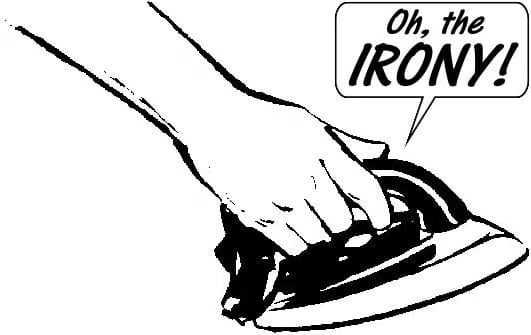Misuse of the Word ‘Irony’

Irony is one word that has been getting massacred more and more lately–mostly because it’s become in-fashion to use it to appear intelligent. The way most people are using it now is to reference any sort of coincidence with negative outcomes or potential:
First Person: "I was running late for work today when I had a really important meeting, and got stopped by a damn train!"Second Person: "Ah, the irony." (satisfied internal smile at using cool word)
Although unexpected outcomes can be part of certain definitions of irony, irony is not, by itself, any sort of unexpected outcome that is funny or negative. Yet that seems to be what most of the masses are turning it into.
So What Does it Mean?
Before I try to give a dissertation into the so-called real definition of this word, it must be noted that I am not writing this as an expert. Instead I’m writing it from the point of view of someone who hates seeing language being raped before me–especially by someone trying to use said language to appear intelligent.
It grates me.
So, let’s try and figure out the proper way to use this word together…
From the Oxford English Dictionary:
Right, because he’s always honest with his constituents…
I particularly like the following summarization, which I found > during my research for this post.
I think this is a good container in which to evaluate the other definitions and sub-definitions. It is further supported by Wikipedia’s first paragraph on the topic, which quotes Henry Watson Fowler in The King’s English as saying:
Any definition of irony—though hundreds might be given, and very few of them would be accepted—must include this, that the surface meaning and the underlying meaning of what is said are not the same.
Brilliant, I think.
Anyway, I’d love to hear from others who think they can help define this overburdened and mistreated word. All I ask in the meantime is that you help the cause by fending off those who use it in pretty much any situation where something strange or unexpected happens.
The best way to address the offender, by the way, is to use the Princess Bride technique:
You keep using this word. I do not think it means what you think it means.
Notes
Wikipedia’s entry on the topic > lists four primary types of irony: verbal irony, dramatic irony, situational irony, and cosmic irony. Verbal is the kind that is discussed above, dramatic is where characters say something thinking it means one thing while the viewer has another interpretation, situational irony is where an outcome is different than what is expected, and cosmic irony covers the difference between human desires and the harshness of the world. Wikipedia notes that the final two are not considered irony by everyone–which is kind of the whole purpose of my post.
I strongly recommend reading this entire piece > on the subject.
There is often confusion about the difference between irony and sarcasm. My favorite English teacher in high school defined sarcasm as irony with ill intent, and a cursory glance at a number of online resources confirms that this is the prevalent view. There is some overlap, however, when it comes to irony that is meant to be biting. Is it not then also sarcasm?
Since I am writing about the correct use of language, I await the comments that illustrate I’ve fallen prey to something like Murphry’s Law > for those who correct people on the proper use of words.
Here’s a great list > of definitions of irony found online.